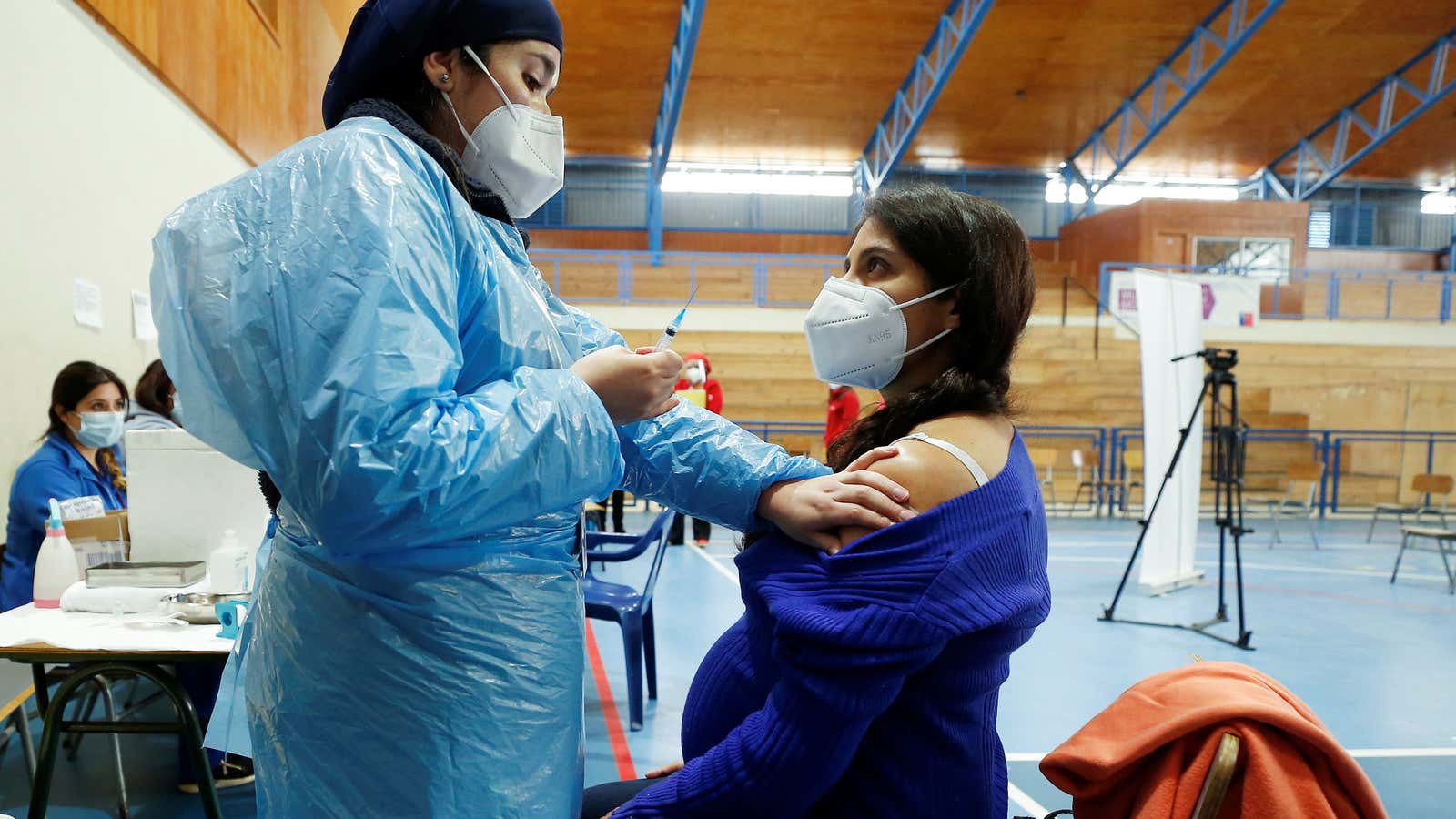There are many reasons pregnant people are among the most hesitant to get a covid-19 vaccine. An important one is that they tend to prioritize the well-being of the baby over theirs, so they are deterred from immunization out of fear their fetus might be harmed.
But not only is the vaccine not harmful to the fetus, but it also provides important protection for the newborn who might be exposed to covid-19 in the first weeks of life, when the immune system is yet to develop completely.
“A healthy mother is a healthy baby,” says Andrea Edlow, a professor of obstetrics and gynecology who researches fetal immunity at Massachusetts General Hospital.
For a pregnant person, getting a covid-19 vaccine—or a booster shot, six months after the last vaccine dose—is essential because it offers protection from the most severe forms of the disease. Pregnant people, Edlow says, are three times more likely to be hospitalized with covid-19, and 1.7 times more likely to die from the virus, than non-pregnant people of the same age. The disease is also linked with risks of miscarriage. Further, newborns are vulnerable to infection, so being in close contact with an unvaccinated person puts them at higher risk of contracting covid-19.
But for the baby’s health the most important aspect of vaccines during pregnancy is that covid-19 immunity travels from the mother to the fetus. When a mother is immunized, the baby receives antibodies against the disease, too.
Should pregnant people get the covid-19 vaccine even if they’ve had covid-19?
Yes. Antibodies against covid-19 develop after infection and are transferred to the fetus, but immunity isn’t quite as strong as that following the vaccination. Edlow’s lab researched this by comparing levels of antibodies, called titers, in pregnant people who had a covid-19 infection and pregnant people who got the vaccine.
“We found that the vaccinated titers were incredibly much higher, like not even in the same ballpark,” she said. This suggests protection from the vaccine is higher and likely to last longer. It is also more reliable, as different levels of antibodies can develop depending on the severity of the covid-19 infection.
Does immunity still transfer to the baby if the mother gets the vaccine before becoming pregnant?
It might, but it’s not certain. Much depends on the levels of antibodies during pregnancy, and how long before the pregnancy the vaccine was administered. Considering the current recommendations are to receive a booster six months after the last dose, getting a shot during pregnancy is a safer bet to ensure the baby is born with covid-19 antibodies.
Should the vaccine be done during a specific trimester of pregnancy?
No. One of the biggest concerns regarding vaccination in pregnancy was that getting it in the first trimester might increase the risk of miscarriage. That isn’t the case. “There’s been a lot of great data coming out recently showing that immunization does not increase the risk of miscarriage in the first trimester, ” says Edlow. Unfortunately, miscarriages are a relatively frequent event, but the risk of occurrence isn’t worsened by the vaccine.
Since receiving the vaccine is safe at any point during the pregnancy, the recommendation is to do it sooner than later. “The main goal of the vaccine is to protect mothers from severe illness, intubation, the need for a heart-lung bypass machine, and death. So in that sense, the best time to get the vaccine is as soon as possible,” says Edlow.
🎧 For more intel on IVF technologies, listen to the Quartz Obsession podcast episode on egg freezing. Or subscribe via: Apple Podcasts | Spotify | Google | Stitcher.
Can breastfeeding replace the vaccine?
The kind of immunity transferred through breastfeeding is different from the immunity of babies in utero, which is passed through the placenta or umbilical cord. In the latter case, it is immunoglobulin G (IgG), which is contained in the blood and bodily fluid, and, once passed to the fetus’s body, protects it from infection for a few months. Breast milk carries a immunoglobulin A (IgA), which is found in the mucous membranes such as those lining the nose or throat, and stops the virus locally.
“Breastfed babies would gain mucosal immunity through breastfeeding because the milk gets all over their nasal passages in the oral and nasal cavities where the virus could enter, and can neutralize it directly in that area,” says Edlow. These kinds of antibodies, however, aren’t transferred into the baby’s bloodstream, and while it might offer some protection in the digestive tract, the immunity is short-lived, ending when the child is no longer breastfed.
New mothers who didn’t receive the vaccine during pregnancy and do so after delivery can—and should—breastfeed their babies, because a little immunity is better than no immunity.
Does breast milk provide immunity if drunk by older children?
Edlow says she is often asked whether feeding breast milk to older children—especially those under five for whom the vaccine isn’t yet authorized—gives them some level of immunity. While there isn’t specific covid-19 research on that, she says it very likely wouldn’t, due to the way milk from breastfeeding enters into the nasal passage and mouth, providing IgA immunity. Drinking milk would deliver the antibodies only to the digestive tract, but leave the nasal ways open for the virus to enter the body.
